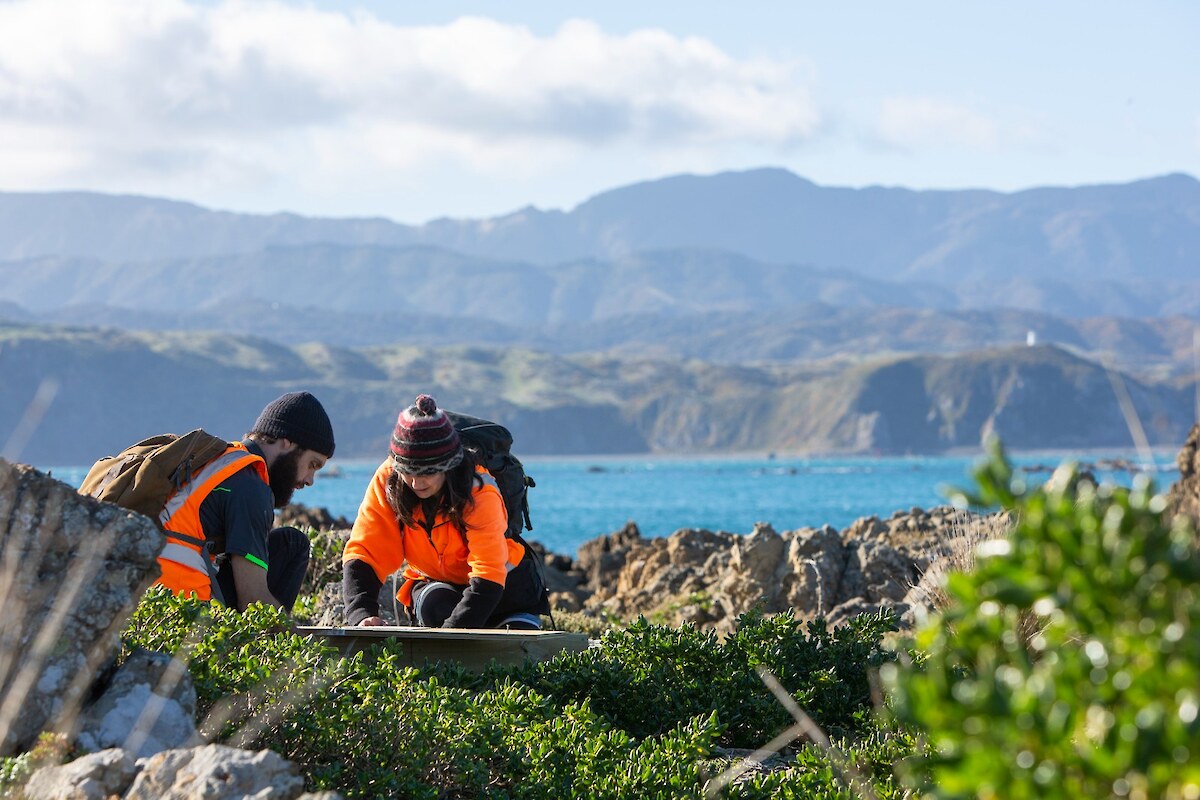Our impact reports
2023/24 Impact Report
MAKING THE IMPOSSIBLE POSSIBLE
2021/22 Impact Report
Strength in Numbers
2020/21 Impact Report
We are resilient
2019/20 Impact Report
A successful recipe
2018/19 Impact Report
How do we create the world’s first predator free capital city?
Phase 1: Te Motu Kairangi, Miramar Peninsula
The outcomes of our work on the Miramar Peninsula are a tribute to an epic collective effort.
The project relied on the support of 20,000 locals, and involved almost every business, school and kindergarten, hundreds of volunteers, Predator Free Miramar, technical experts, and our foundation partners Greater Wellington Regional Council, Wellington City Council, Predator Free 2050 Ltd, NEXT Foundation and Taranaki Whānui ki Te Upoko o Te Ika (Port Nicholson Settlement Trust).
What we achieved:
- Successfully eliminated Norway rats, ship rats, stoats and weasels from the entire Miramar Peninsula (approx 1,000 hectares).
- Developed a replicable blueprint for predator free projects working in urban environments, and reduced costs by up to 75% per hectare.
- 91% increase in native bird detections since the project began.
- Widespread and equitable participation across the project. This means the ecological and wellbeing benefits, like rat free homes or increased wildlife, and potential benefits of participating, like improved psychological and social wellbeing, are not limited to particular sectors of society.

Qualitative evaluation – Most Significant Change
To better understand the impact of our project we are capturing stories from residents, volunteers and staff about changes that may have resulted from being involved in our project on the Miramar Peninsula. We are using a technique called Most Significant Change, which interviews people to help understand hard to measure changes.
We started this work in July 2023 and will keep speaking to those involved in the project to better understand the most significant changes.
Impact theme: Community buy-in and social cohesion
- Change in community buy-in. This story was selected as the most significant due to its unexpected nature. As a panel, we discussed how this story highlights how trapping grows community cohesion, allowing individuals to connect beyond differing views and backgrounds; everyone is in it together. Conservation efforts, via involvement in our project, serve as a medium to restore both community and environmental health.
- Connectivity of people and friendships: This story focuses on friendship and community connection, revealing how volunteer trapping can build resilience and deep relationships. This aspect of change is particularly profound and was an unexpected outcome. The story highlights the importance of building kinship, especially among men who can often struggle with forming such connections.
Impact theme: Changes in biodiversity
- Increase in native birdlife. This story provides local insight into life on the Miramar Peninsula, especially as wildlife begins to thrive again. Where backyards once hosted only blackbirds and sparrows, they now flourish with kārearea, tūī, and kererū – it’s a remarkable transformation!
Impact theme: Changes in the quality of people’s lives
- Career path for skilled predator free workers. This story was selected by our panel as it gave us unique insight into our people and their growth. It shows the importance of long-term funding, and it is clear that the only way we can achieve our national predator free 2050 goal is if we value people and their career progression.
Impact theme: Innovation
- We’ve cracked the methodology. One of our Field Operators shares how Miramar Peninsula has been the proving ground. We are the urban piece of the puzzle for the Predator Free 2050 New Zealand goal. This story was selected by our panel as it recognises how far we’ve come on our predator free journey – we now have a successful formula. There’s massive pride in the work, people see themselves as part of the national picture. This didn’t exist in the same way before.

Quantitative evaluation – Five minute bird counts
A network of 84 five minute bird count stations on Miramar Peninsula monitor the response of local bird populations to our work removing predators. A single bird count has been carried out at each count station in November each year between 2017 and 2024.
A total of 33 bird species has been recorded during these counts over the past seven years including 22 terrestrial bird species, eight of which are native and 14 are introduced. A further four native terrestrial bird species have been reported occurring on Miramar Peninsula by citizen scientists but have not yet been detected during these five minute bird counts.
Trends in the encounter rates of terrestrial bird species:
- Ninety one percent more native birds were counted in 2023 than in 2017.
- Since 2017, mean annual counts of:
- pīwakawaka / New Zealand fantail have increased by 500%
- riroriro / grey warbler have increased by 258%
- tūī have increased by 72%
 Locations of five minute bird count stations surveyed on Miramar Peninsula each year between 2017 and 2022. Yellow triangles represent the seven bird count stations established in 2011 as part of the Wellington City bird monitoring programme; blue circles represent the 77 bird count stations established in 2017 as part of the Miramar Peninsula bird monitoring programme.
Locations of five minute bird count stations surveyed on Miramar Peninsula each year between 2017 and 2022. Yellow triangles represent the seven bird count stations established in 2011 as part of the Wellington City bird monitoring programme; blue circles represent the 77 bird count stations established in 2017 as part of the Miramar Peninsula bird monitoring programme.
